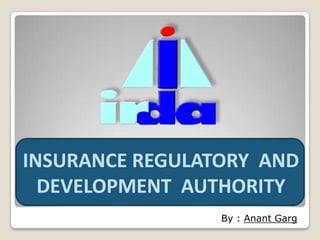Irda
- 1. INSURANCE REGULATORY AND DEVELOPMENT AUTHORITY By : Anant Garg
- 2. ï― ï― ï― ï― ï― ï― ï― ï― ï― ï― Insurance finds a place in writings of Manu ( Manusmrithi ), Yagnavalkya (Dharmasastra ) and Kautilya ( Arthasastra ) Formation of Oriental Insurance Company in Calcutta in 1818. Madras Equitable started Life Insurance in 1829. The Bombay Mutual (1871), Oriental (1874) and Empire of India (1897) started in the Bombay Residency. Formation of Indian Life Assurance Companies Act in 1912. In 1914, the Government of India started publishing returns of Insurance Companies in India. Life Insurance Sector nationalized & formation of LIC on 19th Jan, 1956 . General Insurance Business Act passed in 1972. A committee formed under R.N.Malhotara in 1993 for reforms in Insurance Sector & hence formation of IRDA took place in 1999 as autonomous body. IRDA incorporated as statutory body in April 2000.
- 3. ï― Regulatory apex body in the country for the insurance sector. ï― Setup in 2000 as an autonomous body Headquartered in Hyderabad.
- 4. A) To protect the interests of policyholders B) To promote, regulate and ensure regulatory growth of the insurance industry and for matters connected threw with or incidental thereto C) Conduction of insurance businesses across India in an ethical manner
- 5. As per the section 4 of IRDA ACTâ 1999, Insurance Regulatory & Development Authority which was constituted by an act of parliament specify the composition of authority The Authority is a ten member team consisting of A) Chairman B) Five whole time members C) Four part time members (all are appointed by the Indian government)
- 6. ï― ï― ï― Issue, renew, modify, withdrew and cancel the certificate of registration. Protection the interests of the policy holders. Promoting and regulating professional organizations connected with insurance and re-insurance business
- 7. POWERS ï― ï― Levying fees and other charges for carrying out the purposes of this Act. Specifying the form and manner in which the books of account shall be maintained and statements of accounts shall be tendered by insurance intermediaries.
- 8. FUNCTION ï― ï― ï― Regulating investments of funds by insurance companies. Regulating maintenance of margin of solvency. exercising such other powers as may be prescribed.










